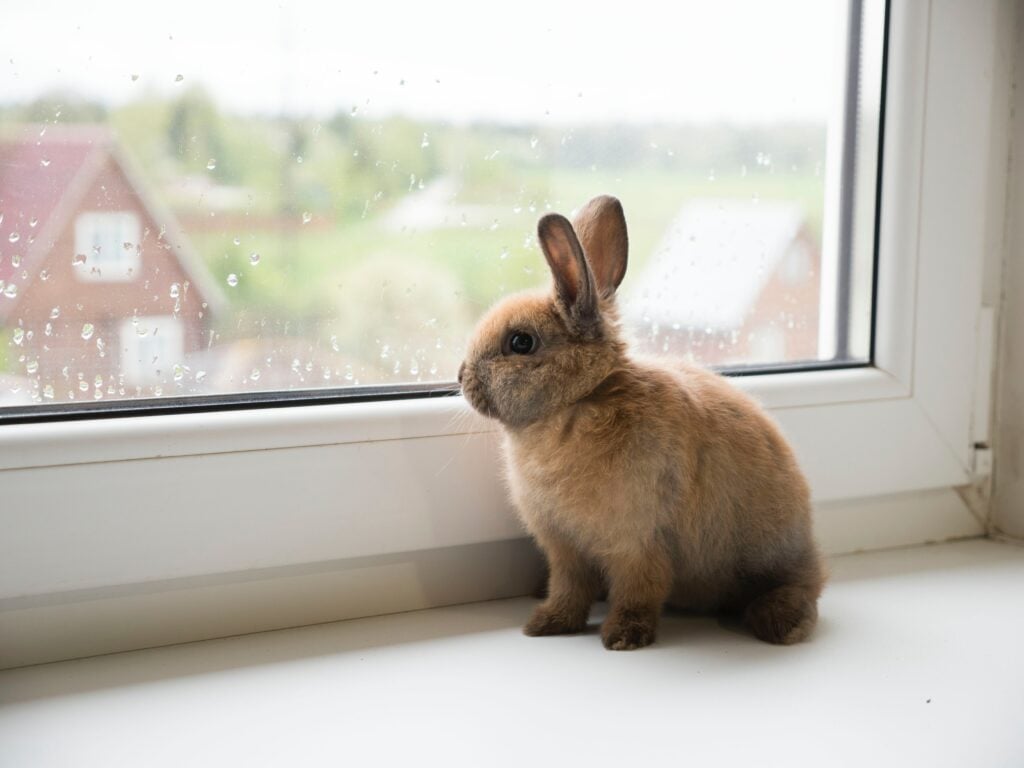Easter is here, which means you will find store shelves crowded with ceramic rabbit figurines and chocolate bunnies. At the same time each year, the demand for real pet rabbits sees a sharp uptick. Unfortunately, those who buy these animals on a whim often fail to make the proper preparations for bringing their new pet home—a process that is especially crucial for rabbit owners living in apartments.
Why Get a Rabbit?
Aside from their undeniable cuteness, rabbits possess many traits that make them ideal companions for city dwellers. While rabbits are capable of “purring” when content and hissing or squealing when in distress, they are generally extremely quiet pets, so you’ll never have to worry about them disturbing your neighbors. Rabbits can also easily be litter trained, which makes cleaning up after them a breeze. They also do not generate very much odor as long as they have been neutered.
Contrary to popular belief, rabbits are not always skittish and standoffish. They can actually be quite affectionate animals that will follow you around and seek out your attention. However, it is important to note that rabbits, unlike cats or dogs, are prey animals. They do not generally like to be picked up or handled excessively, which means they are not good pets for youngsters. Each year, parents make the mistake of purchasing rabbits for their kids without taking the time to learn more about their temperament—and without realizing that rabbits can live up to twelve years and represent a significant commitment. Still, with love and attention, these personable animals make extremely rewarding pets.
Where Should I Get My Rabbit?
Historically, New York City pet stores had a habit of selling rabbits without properly informing their new owners of how to care for them, which led to the frequent abandonment and surrender of rabbits across the city. As such, the city of New York took the step of banning the sale of rabbits in pet stores in all five boroughs in 2016. (The New York State Senate passed a similar bill in 2021 prohibiting the sale of cats, dogs, and rabbits in retail pet stores across the state.) lt is still perfectly legal to own rabbits in New York City provided they come from an alternate source.
One of the best ways to find a rabbit is through a rescue organization such as the Animal Care Centers of NYC. ACC’s adoption process includes a counseling session to ensure owners understand what kind of care their pets need, and their website hosts a continually-updated list of rabbits currently up for adoption.
While there are dozens of displaced rabbits across the city in need of a loving home, buying a rabbit from a reputable breeder is also an option. Breeders can be located through online directories such as RabbitBreeders.us or referred to you by a veterinarian. A good breeder should be able to provide records of their rabbits’ health history and references from others who have bought from them in the past.
What Should I Do Before Bringing My Rabbit Home?
First, make sure that your lease allows rabbits. Some “pet-friendly” apartments have fine printing banning specific animals, so it’s always worth double-checking to be safe.
You should also make sure you understand what to feed your rabbit. 80% of their diet should be made up of low-protein, high-fiber hay such as timothy hay or orchard hay. This can be supplemented with greens, a limited amount of timothy pellets, and occasionally other fresh vegetables as a treat. However, keep the carrots to a minimum—they’re high in carbs and sugar and not actually very good for rabbits.
You should also purchase a pen or hutch for your rabbit so that they always have a safe place to retreat to. This enclosure should be two feet wide by six feet long at absolute minimum in order to provide enough room for them to be comfortable. For apartment living, pens are sometimes the superior option because they often have removable floors that make cleanup much easier.
Rabbits require at least four hours of exercise outside the hutch each day. However, your rabbit will be happiest if they are allowed to have free range of your apartment in much the same way as a housecat would. Before you let your loveable lagomorph loose, however, you must ensure that you’ve created a safe environment for them—and also taken the steps to keep your apartment safe from your rabbit.
How Do I Apartment-Proof My Rabbit?
Rabbits have strong natural instincts to chew and to dig, which means that they are capable of doing damage to your home and furniture if the proper precautions are not taken. This damage can be mitigated by regularly trimming your rabbit’s nails and by ensuring that they are sterilized. Aside from greatly increasing your rabbit’s lifespan, spaying or neutering your rabbit naturally decreases their destructive tendencies.
Another way to curb your rabbit’s gnawing and digging instincts is to channel these impulses into enrichment activities. Providing your rabbits with chew toys made of untreated wood is a must. Your rabbit may also enjoy playing in a cardboard “digging box” filled with shredded paper and treats.
Rabbits are also much less likely to be destructive if they’re receiving the correct amount of social interaction. If you can’t afford to spend several hours a day keeping your rabbit company, they will certainly be better off if provided with another rabbit to keep them company. However, you must be sure that your rabbits are properly bonded before leaving them alone together.

How Do I Rabbit-Proof My Apartment?
Rabbits are infamous for chewing wires, so it’s extremely important to make sure that you keep these out of reach of your rabbit. It is often easiest to block off the area around your TV and entertainment consoles so that your rabbit cannot get at the surrounding cables, while exposed cords in other areas of the house may be protected with wire covers or flex tubing. Flex tubing can also be used to protect the legs of wooden furniture from being nibbled.
Some rabbits like to tear up carpets with their digging, especially in the corners of a room, so it is generally best not to allow your rabbit access to any of the carpeted areas of your apartment if this is a concern. Your rabbit may also like to chew on your baseboards. If this is the case, you can cover them with plastic guards or furring strips for protection.
If you’re worried about your pets getting stuck under furniture (especially recliners, which pose a risk of crushing your rabbit), it’s a good idea to block these spaces off as well. Rabbits also quite like to nibble on paper, so it’s worth moving your books to a higher shelf to avoid this.
In a pinch, you can use bitter apple spray to deter your rabbit from chewing on certain furniture items. However, this spray requires constant reapplication and is not a long-term solution.
Keeping rabbits anywhere, be it the city or the country, requires work and dedication. However, rabbit owners will attest that the love and companionship they provide is absolutely worth it.
Sophie McIntosh is a Brooklyn-based writer and dramaturg hailing from Sun Prairie, Wisconsin. Her plays have been produced by Imaginarium Theatre Company, Platform Production Company, and in the Boston Theater Marathon. Check out more of her work at sophiemcintoshwrites.com!



